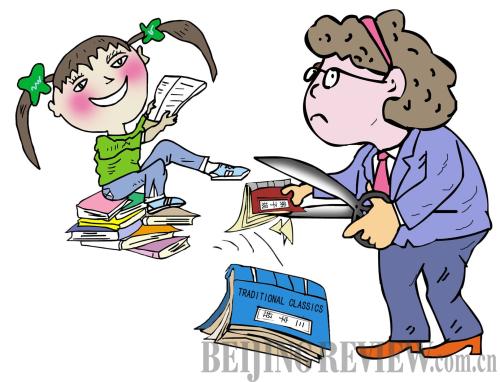|
 |
|
(LI SHIGONG) |
The Department of Education of east China's Shandong Province recently issued a document, requiring middle and primary schools to "screen and filter" traditional classics carefully. The document says some content of traditional masterpieces, such as Students' Rules or The Three-Character Classic, does not conform to today's social value and should be deleted before it is presented to students.
This document has triggered heated debates. Supporters of the document say they believe, in providing education on traditional culture, the good should always be retained and the bad discarded. Opponents say cutting sections from traditional masterpieces damages their integrity. It also deprives students of the chance of developing their ability of making independent judgments.
Education experts say the current craze for traditional classics is a somewhat blinkered and commercially driven movement, and it should be properly directed and further standardized. Meanwhile, traditional culture should not be extracted arbitrarily from original texts according to individuals' personal understanding. The important thing is not to cut out the parts thought to be improper, but to help develop children's ability to make independent judgments about what's right and what's wrong.
In fact, reforms of Chinese textbooks have become the topic of ongoing debate in recent years. The focus of controversies centers on what's the best way of conducting Chinese courses in today's complicated society with diverse values. Is it better to artificially create a sterilized academic environment or to give students the opportunity of learning how to tell good from bad?
Instilling the essence
Guan Yanping (www.xinhuanet.com): The original intention of this document is to remind primary and middle schools of careful arrangement of the courses, so as to prevent them from presenting whatever traditional reading materials they want. Traditional readings have both relevant and outdated concepts. For example, in Students' Rules and The Three-Character Classic are found concepts of fatalism and unconditional obedience, which are leftovers from ancient feudal ethics and superstitions. We must remove outdated concepts before we present traditional masterpieces to young students. If traditional masterpieces are provided without careful screening, it will be, to some extent, harmful to the students.
Cui Jinying (www.xinhuanet.com): Nowadays, almost every student in primary schools and even in kindergartens has a copy of the Students' Rules and The Three-Character Classic. My own daughter, who is 8, is now able to recite many passages from these masterpieces. In retrospect, I even regret my arbitrary decision demanding she learn these masterpieces, because they contain outdated values such as unconditional obedience to seniors and parents, which contradict mainstream modern values. By no means should we expose students to traditional culture without any screening of content. Parents and teachers must help to guide the students and carefully select the content to be taught.
Liu Chuan'e (The Beijing News): As a legacy of ancient feudal China, the values upheld in the Students' Rules and The Three-Character Classic are different from and even opposite to modern values. These old values may impair the building of people's modern values and sense of citizenship. Students are supposed to read traditional Chinese and also foreign masterpieces in a dialectical way. They must also first analyze the content before deciding about what to take from the books. They must know what's bad and what's good based on understanding. Only in this way, can they properly and wisely make use of traditional masterpieces, instead of being slaves to these books.
| 